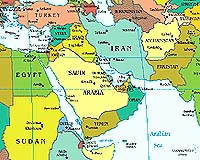| . |  |
. |
Tel Aviv, Israel (UPI) Feb 18, 2009 Amid growing fears of another Middle East war, Hezbollah leader Hassan Nasrallah has thrown down the gauntlet for Israel by vowing to hammer Ben-Gurion Airport if Beirut's Rafik Hariri International is hit, as it was in their last conflict in 2006. That was not likely an idle boast. Nasrallah was unusually specific in what targets Hezbollah would hit, thus signaling its capabilities. "He's never been as detailed and candid," said Lebanese political scientist and Hezbollah expert Amal Saad-Ghorayeb of the American University of Beirut. According to Israel's military intelligence, Hezbollah has in excess of 42,000 rockets and missiles stashed away, including weapons capable of hitting Tel Aviv, Israel's largest metropolis, and even the Dimona nuclear reactor further south in the Negev Desert. Nasrallah's warning in a speech Tuesday night took the warlike rhetoric that has been coming from both sides in recent weeks to new heights. "If you hit our ports, we will hit your ports," he declared. Israeli leaders have warned that in any new war their forces will be merciless, sparing nothing and no one in Lebanon, because Hezbollah is now in the government. Khaled Saghiyeh, editor of Beirut's al-Akhbar newspaper, declared that Nasrallah's threat elevated this enmity to a new level by vowing not only to retaliate but to inflict equal damage. This appeared to be a deliberate move by Nasrallah to portray Hezbollah's guerrillas as a conventional army on a par with Israel's vaunted military, which it fought to a standstill in the 34-day war of 2006, not just a feckless Arab militia. The impact of his speech was somewhat reduced by the fact that he delivered it by closed-circuit video from the bunker where he has been forced to hole up because of at least two Israeli attempts to assassinate him. But even so, Nasrallah, seen in public only once since 2006, skillfully touched a raw Israeli nerve. Israel's nightmare is that if hostilities do break out once more, most likely if it launches pre-emptive strikes against Iran's nuclear infrastructure, the Jewish state's cities will come under an unprecedented bombardment from Hezbollah in the north, Hamas in the south, Syria in the east, as well as Iran. That would be the first time that Israel had to fight an all-out war, in which its long-held military superiority would be of little value because the conflict would be fought at long range, not with tanks and infantry. Its air force and Jericho ballistic missiles would go into action and would undoubtedly do much damage. But Israeli civilian casualties would likely be extremely heavy. Israel would have its nuclear option. But dropping nuclear bombs or unleashing nuclear-tipped Jerichos would leave Israel open to a maelstrom of global condemnation and international isolation. "Either intentionally or unintentionally, Nasrallah hit a very sensitive chord by mentioning by name the Beirut and Tel Aviv airports," Saghiyeh wrote in Wednesday's al-Akhbar. "It was as if instead of just putting an airport (up against) another airport, he put a Lebanese symbol up against an Israeli symbol." Rafik Hariri, five times Lebanon's prime minister and the architect of its reconstruction after the 1975-90 civil war, was assassinated Feb. 14, 2005, in Beirut. The killing of this iconic figure was widely blamed on Syria, which had dominated Lebanon for nearly 30 years. Syria denies that but withdrew its army from Lebanon in the storm of outrage that ensued. David Ben-Gurion is a giant figure in Israel's history. He led the struggle for the creation of the Jewish state and was its first prime minister. Saghiyeh concluded, "Nasrallah's new equation is not intended to merely overcome Israel's military advantage and arrogance but above all else to (reverse) Arab and Lebanese defeatism." Nasrallah was undoubtedly exploiting the international outcry over the assassination of a Hamas chieftain in Dubai in January, a messy affair for which Israel's intelligence service, the Mossad, is suspected. The occasion of his speech was also telling: the second anniversary of the assassination of Hezbollah's much-revered military chief, Imad Mughniyeh, in Damascus, another killing blamed on the Mossad. Nasrallah vowed Hezbollah would take revenge by hitting "a target as big as Imad Mughniyeh," who until Osama bin Laden came along was the world's most wanted fugitive. Israel is bracing for that, too.
Share This Article With Planet Earth
Related Links
 US needs to make more Mideast efforts to corner Iran: Saudi
US needs to make more Mideast efforts to corner Iran: SaudiJeddah (AFP) Feb 16, 2010 Saudi Arabia believes more sanctions and military threats will not stop Iran's nuclear programme and wants Washington to put more effort into negotiations, including an Israeli-Palestinian peace deal, experts and Saudi officials said on Tuesday. After talks with US counterpart Hillary Clinton on Monday, Saudi Foreign Minister Prince Saud al-Faisal criticised Washington's push for more econom ... read more |
|
| The content herein, unless otherwise known to be public domain, are Copyright 1995-2010 - SpaceDaily. AFP and UPI Wire Stories are copyright Agence France-Presse and United Press International. ESA Portal Reports are copyright European Space Agency. All NASA sourced material is public domain. Additional copyrights may apply in whole or part to other bona fide parties. Advertising does not imply endorsement,agreement or approval of any opinions, statements or information provided by SpaceDaily on any Web page published or hosted by SpaceDaily. Privacy Statement |